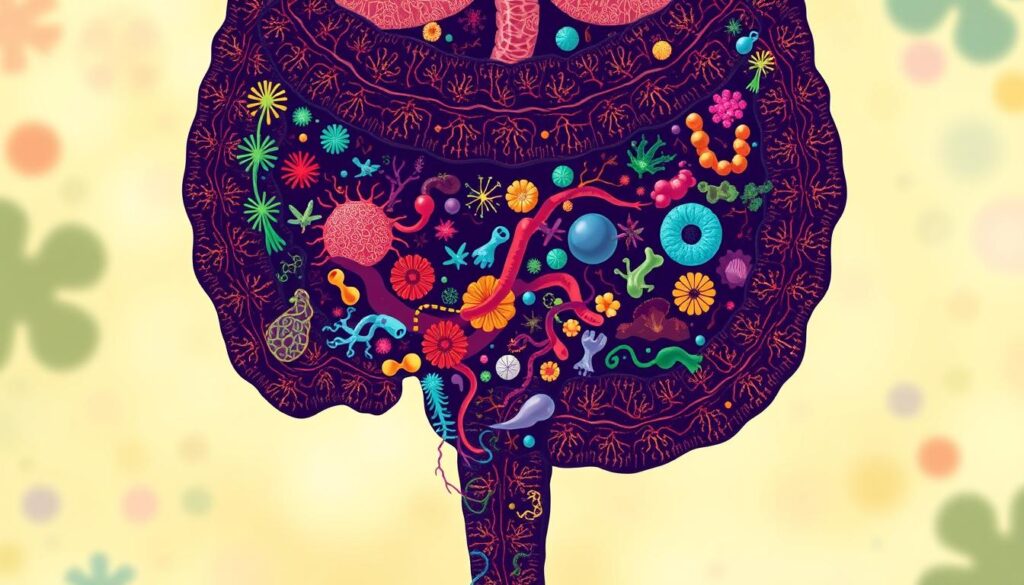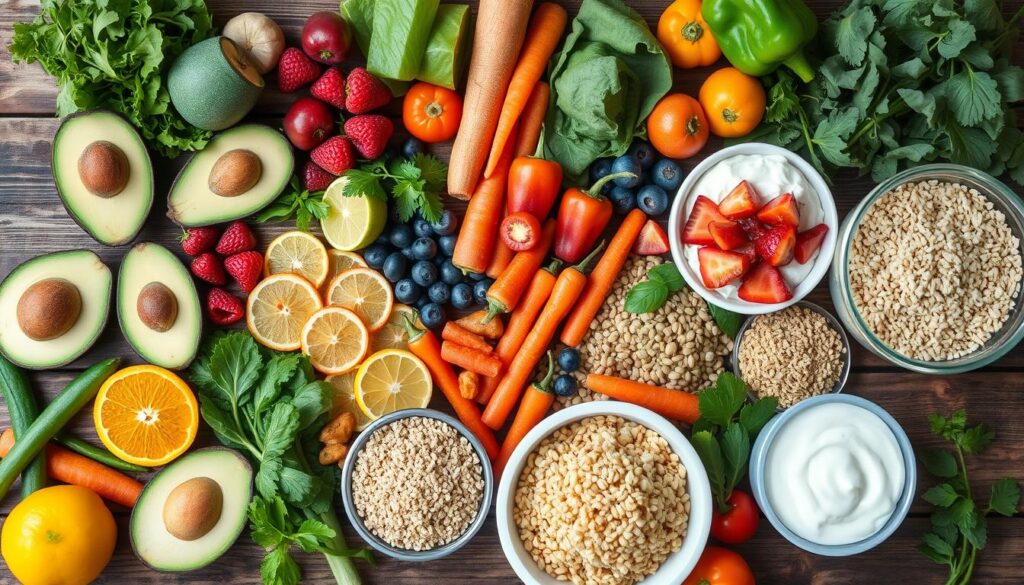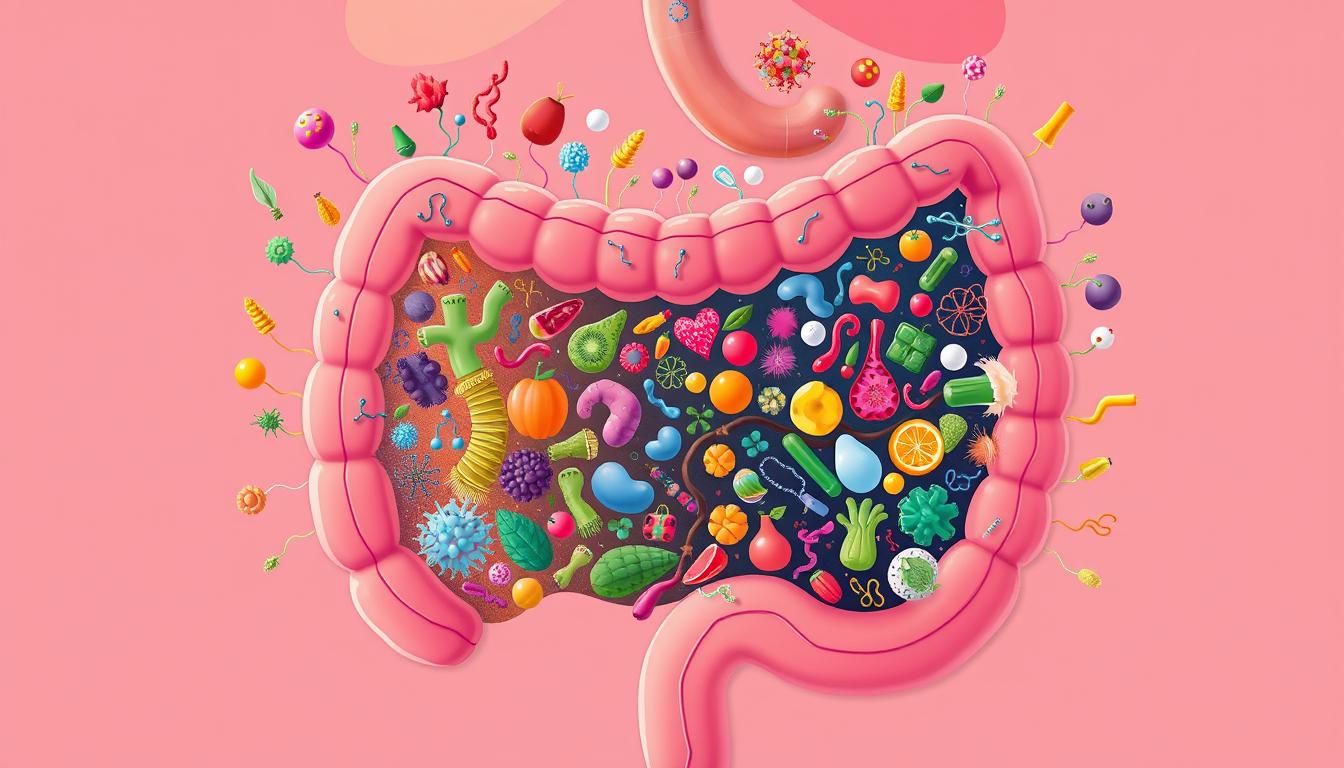Maintaining a healthy gut is crucial for overall well-being. The gut microbiome, the diverse community of beneficial bacteria residing in our digestive system, plays a vital role in supporting immune function, aiding digestion, and even influencing our mental health. In this comprehensive guide, we’ll uncover 10 essential tips to help you improve your gut health and optimize your body’s natural balance.
Key Takeaways
- Understand the importance of a healthy gut microbiome for overall health
- Discover the role of probiotics and fermented foods in supporting digestive wellness
- Learn how to incorporate prebiotic-rich foods into your diet
- Recognize the impact of lifestyle factors, such as stress and sleep, on gut health
- Identify foods to avoid for better gut health
Understanding Your Gut Microbiome and Its Impact on Overall Health
The gut microbiome, the diverse community of trillions of microorganisms that reside in our digestive system, plays a crucial role in our overall health and well-being. These beneficial bacteria are the unsung heroes of our digestive health, contributing to the smooth functioning of our gut and beyond.
The Role of Beneficial Bacteria in Digestive Health
The gut microbiome is a complex and dynamic ecosystem that helps to break down and absorb nutrients from the food we consume. These beneficial bacteria also produce important compounds, such as short-chain fatty acids, that nourish the cells lining our intestines. By maintaining a healthy balance of gut flora, we can optimize our digestive processes and support overall gut health.
How Gut Health Affects Your Immune System
Surprisingly, the gut microbiome has a profound impact on our immune system. Much of our immune function is centered in the gut, where beneficial bacteria interact with immune cells to regulate inflammation and support the body’s natural defenses. When the gut microbiome is out of balance, it can lead to an overactive or underactive immune response, contributing to various health issues.
The Gut-Brain Connection Explained
The gut-brain axis is a bidirectional communication network that links the gastrointestinal system with the central nervous system. Through this intricate connection, the gut microbiome can influence brain function, mood, and even cognitive abilities. Maintaining a healthy gut may therefore be crucial for supporting optimal brain health and overall well-being.
By understanding the complexities of the gut microbiome and its far-reaching effects on our health, we can take proactive steps to nurture and support this vital ecosystem within our bodies.

Tips for Improving Gut Health Through Dietary Changes
Maintaining a healthy gut is essential for overall wellbeing, and dietary choices play a crucial role in supporting a thriving gut microbiome. By incorporating specific foods and nutrients into your daily routine, you can take significant steps towards improving your gut health.
One of the primary ways to boost gut health is by increasing your fiber intake. Fiber-rich foods, such as fruits, vegetables, whole grains, and legumes, act as prebiotics, nourishing the beneficial bacteria in your gut. Aim to consume a variety of high-fiber foods throughout the day to promote a diverse and balanced gut microbiome.
In addition to fiber, fermented foods are also incredibly beneficial for gut health. These foods, such as yogurt, kefir, sauerkraut, and kimchi, contain live and active cultures of probiotics – the good bacteria that help maintain a healthy digestive system. Incorporating fermented foods into your diet can help replenish and diversify your gut microbiome.
Prebiotic-rich foods are another essential component of a gut-friendly diet. Prebiotics are a type of dietary fiber that serve as food for the beneficial bacteria in your gut. Some excellent sources of prebiotics include onions, garlic, bananas, whole grains, and chicory root. Regularly consuming these foods can encourage the growth and proliferation of the good bacteria in your digestive system.
| Fiber-Rich Foods | Fermented Foods | Prebiotic-Rich Foods |
|---|---|---|
| Fruits, Vegetables, Whole Grains, Legumes | Yogurt, Kefir, Sauerkraut, Kimchi | Onions, Garlic, Bananas, Whole Grains, Chicory Root |
By prioritizing these gut-healthy foods in your diet, you can create an environment that supports the growth and diversity of your gut microbiome, leading to improved digestion, immune function, and overall well-being.

The Power of Probiotics and Fermented Foods
Gut health is a crucial aspect of overall well-being, and probiotics and fermented foods play a vital role in maintaining a healthy digestive system. These natural allies are packed with beneficial bacteria that can improve digestion, strengthen the immune system, and even influence mental health.
Best Sources of Natural Probiotics
Probiotic-rich foods are a fantastic way to nourish your gut microbiome. Some of the best natural sources of probiotics include:
- Yogurt (especially Greek yogurt)
- Kefir
- Sauerkraut
- Kimchi
- Miso
- Kombucha
- Tempeh
How to Include Fermented Foods in Your Daily Diet
Incorporating fermented foods into your meals is easier than you might think. Try topping your salads with sauerkraut, adding kimchi to your stir-fries, or sipping on a refreshing kombucha throughout the day. You can also experiment with probiotic-rich dips, spreads, and marinades to add a gut-friendly twist to your favorite dishes.
Benefits of Different Probiotic Strains
| Probiotic Strain | Potential Benefits |
|---|---|
| Lactobacillus acidophilus | Supports nutrient absorption, promotes regularity, and may help alleviate lactose intolerance. |
| Bifidobacterium bifidum | Enhances immune function, reduces inflammation, and may help treat irritable bowel syndrome (IBS). |
| Saccharomyces boulardii | Aids in the treatment of diarrhea, prevents antibiotic-associated infections, and supports gut barrier function. |
By incorporating a diverse array of probiotics and fermented foods into your diet, you can cultivate a thriving gut microbiome and experience the many benefits they have to offer.

Incorporating Prebiotic-Rich Foods into Your Diet
Feeding your gut microbiome with prebiotic-rich foods is a powerful way to support overall digestive health. Prebiotics are a type of dietary fiber that act as food for the beneficial bacteria thriving in your gut. By incorporating these nourishing foods into your diet, you can help cultivate a thriving gut microbiome and experience the many benefits it provides.
One of the best sources of prebiotics is fiber-rich foods. Foods like bananas, onions, garlic, whole grains, and legumes are all excellent prebiotic options. Aim to include a variety of these prebiotic-rich foods in your meals and snacks throughout the day. This will ensure your gut microbiome has a steady supply of the nutrients it needs to thrive.
- Incorporate prebiotic-rich foods like bananas, onions, garlic, and whole grains into your diet.
- Enjoy a variety of fiber-containing foods to nourish your gut microbiome.
- Gradually increase your fiber intake to allow your digestive system to adapt.
In addition to supporting the gut microbiome, prebiotics have been linked to numerous other health benefits. They can help regulate bowel movements, improve nutrient absorption, and even support immune function. By making a conscious effort to incorporate more prebiotics into your diet, you’re taking a proactive step towards better overall health.
“Feeding your gut with the right nutrients is one of the best things you can do for your long-term well-being.”
Remember, when it comes to improving gut health, consistency is key. Start by gradually increasing your intake of prebiotic-rich foods, and be patient as your digestive system adjusts. For personalized guidance or any questions, don’t hesitate to [reach out](https://healthytopix.com/contact/).

Fiber: Your Gut’s Best Friend for Optimal Health
Fiber is a true superstar when it comes to maintaining a healthy gut. This indigestible carbohydrate plays a vital role in supporting your digestive system and promoting the growth of beneficial gut bacteria. By understanding the difference between soluble and insoluble fiber, as well as your daily fiber requirements, you can make informed choices to nourish your gut microbiome and improve overall digestive health.
Soluble vs. Insoluble Fiber
Fiber comes in two main forms: soluble and insoluble. Soluble fiber dissolves in water, forming a gel-like substance that slows down digestion and helps regulate blood sugar levels. Insoluble fiber, on the other hand, does not dissolve and adds bulk to your stool, promoting regular bowel movements and preventing constipation.
Both types of fiber offer unique benefits for your gut health. Soluble fiber feeds the good bacteria in your gut, while insoluble fiber helps to sweep away waste and toxins. Incorporating a variety of fiber-rich foods can help you reap the full rewards of this gut-supporting nutrient.
Daily Fiber Requirements and Best Sources
The recommended daily intake of fiber is 25-30 grams for adults. However, many people struggle to meet this target, often consuming less than half the recommended amount. To ensure you’re getting enough fiber intake, focus on incorporating a range of high-fiber foods into your diet, such as:
- Whole grains (e.g., oats, brown rice, quinoa)
- Fruits (e.g., berries, pears, apples)
- Vegetables (e.g., broccoli, Brussels sprouts, artichokes)
- Legumes (e.g., lentils, chickpeas, black beans)
- Nuts and seeds (e.g., chia seeds, flaxseeds, almonds)
By making fiber-rich foods a regular part of your meals and snacks, you can support your gut microbiome and promote overall digestive health.
Hydration and Its Role in Digestive Wellness
Maintaining proper hydration is essential for supporting overall digestive health and a thriving gut microbiome. Water plays a crucial role in various digestive processes, and ensuring adequate fluid intake can have a profound impact on your gut health.
One of the primary ways that hydration benefits the digestive system is by facilitating the movement of food through the intestines. Water helps to soften stool and promote regular bowel movements, reducing the risk of constipation and other gastrointestinal issues.
Additionally, proper hydration aids in the production of digestive juices, such as saliva, stomach acid, and bile, which are essential for breaking down food and optimizing nutrient absorption. Dehydration can lead to a decrease in these vital fluids, hampering the overall digestive process.
- Aim to drink at least eight 8-ounce glasses of water per day, or more if you’re physically active or in a warm climate.
- Incorporate hydrating foods like fruits and vegetables, which can contribute to your overall fluid intake.
- Avoid sugary or caffeinated beverages, as they can have a dehydrating effect on the body.
“Staying hydrated is one of the easiest and most effective ways to support your gut health and overall digestive wellness.”
By prioritizing hydration, you can help maintain a healthy gut microbiome, promote regular bowel movements, and support the efficient functioning of your digestive system. Incorporating water-rich foods and beverages into your daily routine can be a simple yet powerful step towards optimal gut health.
Lifestyle Factors Affecting Gut Health
Maintaining a healthy gut goes beyond just dietary changes. Your overall lifestyle and daily habits can have a significant impact on the delicate balance of your gut microbiome. From stress management to exercise routines and sleep quality, these factors play a crucial role in supporting digestive wellness.
Stress Management Techniques
Chronic stress can disrupt the gut-brain axis, leading to an imbalance in gut bacteria and a range of digestive issues. To counter the negative effects of stress on gut health, consider incorporating stress management techniques into your daily routine. Practices like meditation, deep breathing exercises, and mindfulness can help lower stress levels and promote a healthier gut environment.
Exercise and Gut Health Connection
Regular physical activity is not only good for your overall health but can also have a positive impact on your gut. Exercise has been shown to increase the diversity of beneficial bacteria in the gut, improve intestinal motility, and reduce inflammation. Aim for a well-rounded exercise routine that includes a combination of aerobic, strength, and flexibility training to support your gut health.
Sleep Quality Impact on Digestion
The quality and quantity of your sleep can greatly influence your gut health. Inadequate or poor-quality sleep can disrupt the delicate balance of your gut microbiome, leading to issues like inflammation, altered nutrient absorption, and an increased risk of digestive problems. Prioritize getting 7-9 hours of quality sleep each night to support your gut health and overall well-being.
| Lifestyle Factor | Impact on Gut Health | Recommended Practices |
|---|---|---|
| Stress Management | Disruption of gut-brain axis, imbalance in gut bacteria | Meditation, deep breathing, mindfulness |
| Exercise | Increased diversity of beneficial bacteria, improved intestinal motility, reduced inflammation | Aerobic, strength, and flexibility training |
| Sleep Quality | Disruption of gut microbiome balance, inflammation, altered nutrient absorption | 7-9 hours of quality sleep per night |
“Gut health is not just about what you eat, but also how you live. Incorporating stress-reducing practices, regular exercise, and quality sleep into your daily routine can have a profound impact on the well-being of your gut microbiome.”
Foods to Avoid for Better Gut Health
Maintaining a healthy gut is crucial for overall well-being, and one of the most important steps is being mindful of the foods you consume. Certain foods can negatively impact your gut health, leading to digestive discomfort, inflammation, and an imbalance in your gut microbiome.
Here are some foods to consider avoiding or limiting for better gut health:
- Processed and fried foods – These are often high in unhealthy fats, additives, and preservatives that can disrupt the delicate balance of your gut flora.
- Refined carbohydrates – Sugary and white flour-based products can feed harmful gut bacteria, leading to inflammation and other digestive issues.
- Artificial sweeteners – These synthetic compounds have been linked to negative impacts on the gut microbiome and may contribute to gastrointestinal problems.
- Alcohol – Excessive alcohol consumption can damage the gut lining and alter the composition of your gut bacteria.
- Antibiotics – While necessary in some cases, antibiotics can wipe out both harmful and beneficial gut bacteria, leading to an imbalance.
Instead, focus on incorporating more gut-friendly foods such as fermented foods, high-fiber fruits and vegetables, and healthy fats. By making mindful dietary choices, you can support a thriving gut microbiome and promote overall digestive wellness.
Remember, every individual’s gut health is unique, so it’s essential to pay attention to how your body responds to different foods and make adjustments accordingly. Consult with a healthcare professional if you have persistent gut-related issues.
Conclusion
Throughout this article, we’ve explored the crucial role of gut health in maintaining overall wellness. By understanding the intricacies of the gut microbiome and its far-reaching impacts on our immune system, brain function, and beyond, we’ve uncovered practical tips for improving gut health that can transform your digestive wellness.
From nourishing your gut with probiotic-rich foods and prebiotic-packed produce to managing stress and prioritizing quality sleep, the strategies outlined can empower you to cultivate a thriving digestive wellness ecosystem. Remember, small consistent steps can lead to significant improvements in your gut health, so don’t be discouraged – start implementing these tips today and experience the profound benefits for yourself.
Maintaining a healthy gut is an ongoing journey, but one that is well worth the effort. By prioritizing your digestive well-being, you’re investing in your overall health and vitality. Embrace these insights, get creative in the kitchen, and watch as your gut health blossoms, allowing you to feel your best from the inside out.





